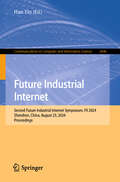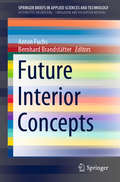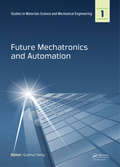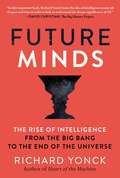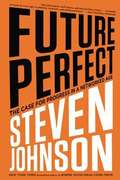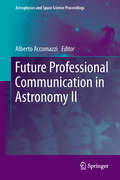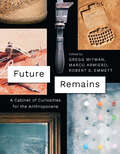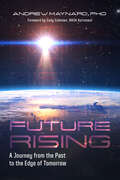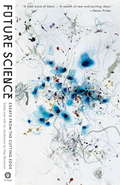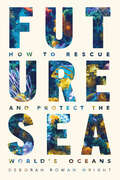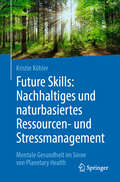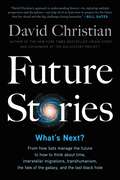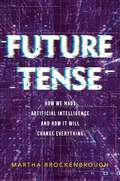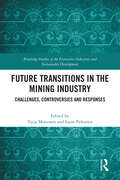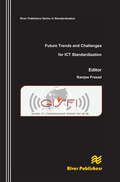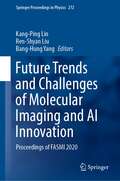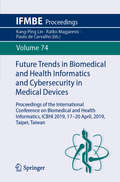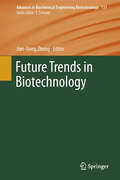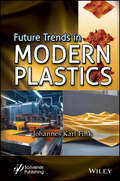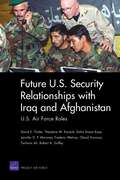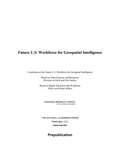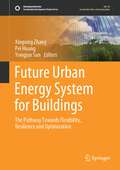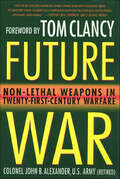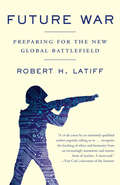- Table View
- List View
Future Industrial Internet: Second Future Industrial Internet Symposium, FII 2024, Shenzhen, China, August 23, 2024, Proceedings (Communications in Computer and Information Science #2446)
by Hao YinThis book constitutes the proceedings of the Second Future Industrial Internet Symposium, FII 2024, held in Shenzhen, China, on August 23, 2024. The 12 full papers and 4 short papers presented in this book were carefully reviewed and selected from 75 submissions.They focus on verious aspects of the latest research, applications and development trends related to the industrial internet and associated fields.
Future Interior Concepts (SpringerBriefs in Applied Sciences and Technology)
by Anton Fuchs Bernhard BrandstätterIn this book, the authors highlight multiple aspects of and views on comprehensive automotive interior comfort for future mobility. In this context, passenger comfort comprises thermal, acoustic, seat perception, as well as human–machine interaction in the passenger cabin. In five chapters, the contributing authors, hailing from universities, research centers and industry, share their expertise and insights. They take a closer look at future interior concepts from the standpoints of fundamental and applied research, as well as practical aspects.
Future Magic
by Robert L. ForwardThis nonfiction book takes a crack at predicting the future and has some exciting prospects ahead for us.
Future Mechatronics and Automation: Proceedings of the 2014 International Conference on Future Mechatronics and Automation, (ICMA 2014), 7-8 July, 2014, Beijing, China (Studies in Materials Science and Mechanical Engineering)
by GuohuiYangThis proceedings volume contains selected papers presented at the 2014 International Conference on Future Mechatronics and Automation, held in Beijing, China. Contributions cover the latest developments and advances in the field of Mechatronics and Automation.
Future Minds: The Rise of Intelligence from the Big Bang to the End of the Universe
by Richard YonckFor Readers of Michio Kaku and Stephen Hawking, an Epic Journey through the Intelligent Universe With the ongoing advancement of AI and other technologies, our world is becoming increasingly intelligent. From chatbots to innovations in brain-computer interfaces to the possibility of superintelligences leading to the Singularity later this century, our reality is being transformed before our eyes. This is commonly seen as the natural result of progress, but what if there&’s more to it than that? What if intelligence is an inevitability, an underlying property of the universe? In Future Minds, Richard Yonck challenges our assumptions about intelligence—what it is, how it came to exist, its place in the development of life on Earth and possibly throughout the cosmos. Taking a Big History perspective—over the 14 billion years from the Big Bang to the present and beyond—he draws on recent developments in physics and complexity theory to explore the questions: Why do pockets of increased complexity develop, giving rise to life, intelligence, and civilization? How will it grow and change throughout this century, transforming both technology and humanity? As we expand outward from our planet, will we discover other forms of intelligence, or will we conclude we are destined to go it alone? Any way we look at it, the nature of intelligence in the universe is becoming a central concern for humanity. Ours. Theirs. And everything in between.
Future Perfect
by Steven JohnsonCombining the deft social analysis of Where Good Ideas Come From with the optimistic arguments of Everything Bad Is Good for You, New York Times bestselling author and one of the most inspiring visionaries of contemporary culture, Steven Johnson, maps the ways a connected world will be both different and better. Steven Johnson proposes that a new model of political change is on the rise transforming everything from local government to classrooms to health care. It's a compelling new political worldview that breaks with traditional categories of liberal or conservative thinking. Johnson explores this innovative vision through a series of fascinating narratives: from the "Miracle on the Hudson" to the planning of the French railway system; from the battle against malnutrition in Vietnam to a mysterious outbreak of strange smells in downtown Manhattan; from underground music video artists to the invention of the Internet itself. At a time when the conventional wisdom holds that the political system is hopelessly gridlocked with old ideas, Future Perfect makes the timely and uplifting case that progress is still possible.
Future Professional Communication in Astronomy II
by Alberto AccomazziThe present volume gathers together the talks presented at the second colloquim on the Future Professional Communication in Astronomy (FPCA II), held at Harvard University (Cambridge, MA) on 13-14 April 2010. This meeting provided a forum for editors, publishers, scientists, librarians and officers of learned societies to discuss the future of the field. The program included talks from leading researchers and practitioners and drew a crowd of approximately 50 attendees from 10 countries. These proceedings contain contributions from invited and contributed talks from leaders in the field, touching on a number of topics. Among them: - The role of disciplinary repositories such as ADS and arXiv in astronomy and the physical sciences; - Current status and future of Open Access Publishing models and their impact on astronomy and astrophysics publishing; - Emerging trends in scientific article publishing: semantic annotations, multimedia content, links to data products hosted by astrophysics archives; - Novel approaches to the evaluation of facilities and projects based on bibliometric indicators; - Impact of Government mandates, Privacy laws, and Intellectual Property Rights on the evolving digital publishing environment in astronomy; - Communicating astronomy to the public: the experience of the International Year of Astronomy 2009.
Future Remains: A Cabinet of Curiosities for the Anthropocene
by Gregg Mitman Marco Armiero Robert EmmettWhat can a pesticide pump, a jar full of sand, or an old calico print tell us about the Anthropocene—the age of humans? Just as paleontologists look to fossil remains to infer past conditions of life on earth, so might past and present-day objects offer clues to intertwined human and natural histories that shape our planetary futures. In this era of aggressive hydrocarbon extraction, extreme weather, and severe economic disparity, how might certain objects make visible the uneven interplay of economic, material, and social forces that shape relationships among human and nonhuman beings? Future Remains is a thoughtful and creative meditation on these questions. The fifteen objects gathered in this book resemble more the tarots of a fortuneteller than the archaeological finds of an expedition—they speak of planetary futures. Marco Armiero, Robert S. Emmett, and Gregg Mitman have assembled a cabinet of curiosities for the Anthropocene, bringing together a mix of lively essays, creatively chosen objects, and stunning photographs by acclaimed photographer Tim Flach. The result is a book that interrogates the origins, implications, and potential dangers of the Anthropocene and makes us wonder anew about what exactly human history is made of.
Future Rising: A Journey from the Past to the Edge of Tomorrow (Analyzing The Future Ser.)
by Andrew MaynardA scientist offers compelling visions and potential pitfalls of the future—in &“a journey through time, space, and the human experience&” (Dr. Tanya Harrison, coauthor of For All Humankind). Humanity has gained the ability not only to imagine the future, but to design and engineer it. At times entertaining, and at others profound, Future Rising provides an original perspective on our relationship with the future. As a species, we&’ve become talented architects of our future—yet we often struggle to come to terms with what this means. As innovation and rapidly shifting norms and expectations drive our world at breakneck speed, we sometimes need to find a still, quiet place to pause and think. Future Rising creates such a place, where we can take advantage of our species&’ knowledge of world history and the importance of science to piece together a positive future. To create a good future, we must rediscover the past. Our relationship with the future is inextricably intertwined with where we&’ve come from, who we are, and what we aspire to. Future Rising starts at the beginning of all things with the Big Bang and traces a pathway along the emergence of intelligent life, through what makes humans uniquely capable of imagining and creating different futures. In a series of sixty short reflections, Andrew Maynard, a former physicist and nationally recognized expert in technology and society, will take you on a journey into: What &“the future&” actually isHow it molds and guides our livesHow we can use the history of the world to change our future &“A thoughtful and thought-provoking response to the moment we&’re in, chronicling how we got here, where we&’re going, and what role we have in that journey.&” —Ramona Pringle, Director of Creative Innovation Studio and Associate Professor, Ryerson University
Future Science
by Max BrockmanEditor Max Brockman presents the work of some of today's brightest and most innovative young researchers in this fascinating collection of writings that introduce the very latest theories and discoveries in science. Future Science features eighteen young scientists, most of whom are presenting their work and ideas to a general audience for the first time. Included in this collection are* William McEwan, a virologist, discussing his research into the biology of antiviral immunity* Naomi Eisenberger, a neuroscientist, wondering how social rejection affects us physically* Jon Kleinberg, a computer scientist, showing what massive datasets can teach us about society and ourselves* Anthony Aguirre, a physicist, who gives readers a tantalizing glimpse of infinity"Future Science shares with the world a delightful secret that we academics have been keeping--that despite all the hysteria about how electronic media are dumbing down the next generation, a tidal wave of talent has been flooding into science, making their elders feel like the dumb ones. . . . It has a wealth of new and exciting ideas, and will help shake up our notions regarding the age, sex, color, and topic clichés of the current public perception of science."--Steven Pinker, author of The Stuff of ThoughtFrom the Trade Paperback edition.
Future Sea: How to Rescue and Protect the World’s Oceans
by Deborah Rowan WrightA counterintuitive and compelling argument that existing laws already protect the entirety of our oceans—and a call to understand and enforce those protections. The world’s oceans face multiple threats: the effects of climate change, pollution, overfishing, plastic waste, and more. Confronted with the immensity of these challenges and of the oceans themselves, we might wonder what more can be done to stop their decline and better protect the sea and marine life. Such widespread environmental threats call for a simple but significant shift in reasoning to bring about long-overdue, elemental change in the way we use ocean resources. In Future Sea, ocean advocate and marine-policy researcher Deborah Rowan Wright provides the tools for that shift. Questioning the underlying philosophy of established ocean conservation approaches, Rowan Wright lays out a radical alternative: a bold and far-reaching strategy of 100 percent ocean protection that would put an end to destructive industrial activities, better safeguard marine biodiversity, and enable ocean wildlife to return and thrive along coasts and in seas around the globe. Future Sea is essentially concerned with the solutions and not the problems. Rowan Wright shines a light on existing international laws intended to keep marine environments safe that could underpin this new strategy. She gathers inspiring stories of communities and countries using ocean resources wisely, as well as of successful conservation projects, to build up a cautiously optimistic picture of the future for our oceans—counteracting all-too-prevalent reports of doom and gloom. A passionate, sweeping, and personal account, Future Sea not only argues for systemic change in how we manage what we do in the sea but also describes steps that anyone, from children to political leaders (or indeed, any reader of the book), can take toward safeguarding the oceans and their extraordinary wildlife.
Future Skills: Mentale Gesundheit im Sinne von Planetary Health
by Kristin KöhlerIn einer Zeit multipler Krisen – vom Klimawandel über mentale Erschöpfung bis zur globalen Überforderung – bietet dieses Buch einen evidenzbasierten, naturbasierten Handlungsansatz zur Stärkung psychischer Gesundheit und planetarer Resilienz. Es verbindet aktuelle Forschung mit praxisnahen Tools für Alltag, Lehre, Beratung, Coaching und Betriebliches Gesundheitsmanagement (BGM). Dieses Fachbuch etabliert ein ökosystemisches Gesundheitsverständnis im Rahmen von Planetary Health, mit Fokus auf mentale Gesundheit. Es stellt über 30 direkt anwendbare Übungen und Mikrointerventionen vor, die Resilienz, Naturbindung und nachhaltige Lebensführung fördern. Naturtherapeutische, achtsamkeitspädagogische und systemisch-regenerative Ansätze werden erstmals in einem konzeptzentrierten und praxisorientierten Kompetenztraining für mentale Gesundheit integriert. Ziel ist ein doppelter Co-Benefit: individuelle Gesundheitsförderung und ein aktiver Beitrag zum Klima- und Umweltschutz – Green Mental Health als Zukunftskompetenz. Das Buch richtet sich an Fachkräfte in Medizin, Psychologie, Public Health, Sozialer Arbeit, Umwelt- und Bildungswissenschaften – ebenso wie an Coaches, BGM-Verantwortliche als auch interessierte Studierende und alle, die klassische Stressbewältigung durch naturbasierte und nachhaltige Strategien zukunftsorientiert erweitern möchten.
Future Stories: What's Next?
by David ChristianThe New York Times bestselling author of Origin Story, who Bill Gates has &“long been a fan of,&” turns his attention to the future of humanity — and how we think about it — in this ambitious book. The future is uncertain, a bit spooky, possibly dangerous, maybe wonderful. We cope with this never-ending uncertainty by telling stories about the future, future stories. How do we construct those stories? Where is the future, the place where we set those stories? Can we trust our future stories? And what sort of futures do they show us? This book is about future stories and future thinking, about how we prepare for the future. Think of it as a sort of User&’s Guide to the Future. We all need such a guide because the future is where we will spend the rest of our lives. David Christian, historian and author of Origin Story, is renowned for pioneering the emerging discipline of Big History, which surveys the whole of the past. But with Future Stories, he casts his sharp analytical eye forward, offering an introduction to the strange world of the future, and a guide to what we think we know about it at all scales, from the individual to the cosmological. Christian consults theologians, philosophers, scientists, statisticians, and scholars from a huge range of places and times as he explores how we prepare for uncertain futures, including the future of human evolution, artificial intelligence, interstellar travel, and more. By linking the study of the past much more closely to the study of the future, we can begin to imagine what the world will look like in a hundred years and consider solutions to the biggest challenges facing us all.
Future Tense: How We Made Artificial Intelligence—and How It Will Change Everything
by Martha BrockenbroughHuman history has always been shaped by technology, but AI is like no technology that has come before it. Unlike the wheel, combustion engines, or electricity, AI does the thing that humans do best: think. While AI hasn’t reproduced the marvelously complex human brain, it has been able to accomplish astonishing things. AI has defeated our players at games like chess, Go, and Jeopardy!. It’s learned to recognize objects and speech. It can create art and music. It’s even allowed grieving people to feel as though they were talking with their dead loved ones.On the flip side, it’s put innocent people in jail, manipulated the emotions of social media users, and tricked people into believing untrue things.In this non-fiction book for teens, acclaimed author and teacher Martha Brockenbrough guides readers through the development of this world-changing technology, exploring how AI has touched every corner of our world, including education, healthcare, work, politics, war, international relations, and even romance. This is essential reading for anyone who wants to understand how artificial intelligence got here, how to make the best use of it, and how we can expect it to transform our lives.
Future Transitions in the Mining Industry: Challenges, Controversies and Responses (Routledge Studies of the Extractive Industries and Sustainable Development)
by Tuija Mononen Lasse PeltonenThis volume focuses on mining and the challenges for this industry as it transitions and evolves as the demand for products and responsible and sustainable mining ever increases.Mining is a prerequisite for modern society, yet the industry is often criticized for having many negative environmental and social impacts. The volume explores the challenges, controversies and responses that arise when a society is reliant on the products of mining to maintain their standard of living, yet are simultaneously calling for the implementation of sustainable practices, with many communities also being resistant to mining activities taking place in their own location. Many transitions which present a solution to one problem can often lead to new issues and developments elsewhere. For example, the electrification of vehicles will help to mitigate climate change, but this will simultaneously increase the demand for minerals required for batteries. The acceptance of, or resistance to, mining varies from location to location and across different scales, with key factors relating to the social and environmental impacts and the economic benefits. One common tension revolves around whether local communities really benefit economically from mining activities, and even if they do, they could now be negatively impacted by the digitization of the industry which will naturally lead to a reduction in the number of jobs. This volume explains how transitions of these types are inextricably linked by demand, acceptance and the perception of benefits, and that as the industry evolves, more tensions and controversies will develop.This book will be of great interest to scholars and students of mining and the extractive industries, transitions and sustainable development, as well as to professionals working in natural resource management.
Future Trends and Challenges for ICT Standardization
by Ramjee PrasadThis book comes in response to the Future Trends and Challenges for ICT Standardization. The technological areas covered are:• the need, importance and management of radio spectrum,• the development of future radio access technologies,• the convergence of telecommunications and broadcasting,• the possibilities and challenges brought by the Internet of Things (IoT),• the environment sustainability through the use of Green ICT,The book aims at identifying the importance of ICT standardization for strengthening the Indian industrial and business sector through Global ICT Standardization Forum for India (GISFI-www.gisfi.org). Further, it outlines the major challenges and trends in the ICT development worldwide, while mapping the Indian efforts on the background of the overall progress.The motivation behind this book is that a more informed context is made available to ensure sustainable scientific and economic growth.Finally, the book puts forward the best research roadmaps, strategies and challenges contributed by engineers from the industry, academia, and Government. It addresses the benefits to the entire society resulting from standardization.
Future Trends and Challenges of Molecular Imaging and AI Innovation: Proceedings of FASMI 2020 (Springer Proceedings in Physics #272)
by Kang-Ping Lin Ren-Shyan Liu Bang-Hung YangThis volumes presents the proceedings of the FASMI 2020 conference, held at Taipei Veterans General Hospital on November 20-22, 2020. It presents contributions on all aspects of molecular imaging, discovered by leading academic scientists and researchers. It also provides a premier interdisciplinary treatment of recent innovations, trend, and concerns as well as practical challenges and solutions in Molecular Imaging and put an emphasis on Artificial Intelligence applied to Imaging Data. FASMI is the annual meeting of the Federation of Asian Societies for Molecular Imaging
Future Trends in Biomedical and Health Informatics and Cybersecurity in Medical Devices: Proceedings of the International Conference on Biomedical and Health Informatics, ICBHI 2019, 17-20 April 2019, Taipei, Taiwan (IFMBE Proceedings #74)
by Paulo De Carvalho Ratko Magjarevic Kang-Ping LinThis book gathers the proceedings of the IV International Conference on Biomedical and Health Informatics (ICBHI 2019), held on 17-20 April, 2019, in Taipei, Taiwan. Contributions span a range of topics, including medical imaging, biosignal processing, biodata management and analytics, public and personalized health systems, mobile health applications and many more. The IV conference edition gave a special emphasis to cybersecurity issues and cutting-edge medical devices, as it is reflected in this book, which provides academics and professionals with extensive knowledge on and a timely snapshot of cutting-edge research and developments in the field of biomedical and health informatics.
Future Trends in Biotechnology
by Jian-Jiang ZhongSystems Metabolic Engineering: The Creation of Microbial Cell Factories by Rational Metabolic Design and Evolution, by Chikara Furusawa, Takaaki Horinouchi, Takashi Hirasawa, Hiroshi Shimizu Impacts of Quorum Sensing on Microbial Metabolism and Human Health, by Yang-Chun Yong, Jian-Jiang Zhong CHO Glycosylation Mutants as Potential Host Cells to Produce Therapeutic Proteins with Enhanced Efficacy, by Peiqing Zhang, Kah Fai Chan, Ryan Haryadi, Muriel Bardor, Zhiwei Song Cell-Free Biosystems for Biomanufacturing, by Chun You, Y.-H. Percival Zhang Lipid Bilayer Membrane Arrays: Fabrication and Applications, by Xiaojun Han, Guodong Qi, Xingtao Xu, Lei Wang RNA Aptamers: A Review of Recent Trends and Applications, by Kyung-Nam Kang, Yoon-Sik Lee
Future Trends in Modern Plastics
by Johannes Karl FinkFuture Trends in MODERN PLASTICS The prolific author and polymer scientist discusses the current topics in the plastics industry and recommends future research in sustainable polymers and the recycling routes of plastic waste. The book opens with a chapter discussing newly developed monomers such as alkylene-based monomers, epoxide monomers, diol-based monomers, bio-based monomers, and several other types, Modern polymerization methods are then explained, such as ionic polymerization, plasma polymerization, and ring-opening polymerization. The book moves on to special issues and some future trends in the plastics industry with recommendations for future research. Plastics have given society enormous benefits because of their versatility, light weight, durability, and low costs. However, these properties have come with negative impacts because these persistent materials are leaked into the environment during their entire life cycle. Therefore, critical chapters report on the future directions for sustainable polymers, the valorization of plastic waste, and the recovery, treatment and recycling routes of plastic waste. The book concludes with chapters on the usage of plastics in medical devices, as well as the use of plastics in restoration, food applications, additive classes, and manufacturing. Audience The book will be used by plastics engineers, chemists, polymer and materials scientists in both academia and the plastics industry.
Future U.S. Security Relationships with Iraq and Afghanistan
by Frederic Wehrey David E. Thaler Dalia Dassa Kaye Jennifer D. Moroney Theodore W. KarasikThe authors describe possible regional security structures and bilateral U.S. relationships with Iraq and Afghanistan. They recommend that the United States offer a wide range of security cooperation activities to compatible future governments in Kabul and Baghdad but should also plan to hedge against less-favorable contingencies. They emphasize that the U.S. Air Force should expect to remain heavily tasked for the foreseeable future.
Future U.S. Workforce for Geospatial Intelligence
by National Research Council of the National AcademiesWe live in a changing world with multiple and evolving threats to national security, including terrorism, asymmetrical warfare (conflicts between agents with different military powers or tactics), and social unrest. Visually depicting and assessing these threats using imagery and other geographically referenced information is the mission of the National Geospatial-Intelligence Agency (NGA). As the nature of the threat evolves, so do the tools, knowledge, and skills needed to respond. Technological advances are moving geospatial tools and near-real-time information products into the hands of warfighters, emergency responders, and other users. New geospatial themes and interdisciplinary approaches to problem solving that could potentially improve geospatial intelligence (GEOINT) are emerging in university curricula. In addition, a new generation of students accustomed to working in flexible, socially connected, and highly integrated technological environments is bringing new capabilities into the workplace. <P> The challenge for NGA is to maintain a workforce that can deal with evolving threats to national security, ongoing scientific and technological advances, and changing skills and expectations of workers. The agency’s success depends in part on the availability of experts with suitable knowledge and skills. At the request of H. Greg Smith, NGA chief scientist, the National Research Council (NRC) established a committee to assess the supply of expertise in geospatial intelligence fields, identify gaps in expertise relative to NGA’s needs, and suggest ways to ensure an adequate supply of geospatial intelligence expertise over the next 20 years. <P><P> This report analyzes the geospatial intelligence workforce in 10 areas defined in New Research Directions for the National-Geospatial Intelligence Agency: Workshop Report (NRC, 2010a), including 5 core areas (geodesy and geophysics, photogrammetry, remote sensing, cartographic science, geographic information systems [GIS] and geospatial analysis) and 5 emerging areas (GEOINT fusion, crowdsourcing, human geography, visual analytics, and forecasting). The availability of expertise in these areas was assessed using education and labor statistics collected from government sources. Gaps in expertise relative to NGA’s needs were identified by comparing the statistics to information on NGA’s current scientist and analyst positions and published assessments of demand for geospatial occupations. Ideas for building the necessary knowledge and skills were chosen based on a review of training programs in universities, professional societies, government agencies, and private companies.
Future Urban Energy System for Buildings: The Pathway Towards Flexibility, Resilience and Optimization (Sustainable Development Goals Series)
by Xingxing Zhang Pei Huang Yongjun SunThis book investigates three main characteristics of future urban energy system for buildings, including flexibility, resilience and optimization. It explores the energy flexibility by considering renewable energy integration with buildings, sector coupling, and energy trading in the local energy market. Energy resilience is addressed from aspects of future climate change, pandemic crisis, and operational uncertainties. Approaches for system design, dynamic pricing and advanced control are discussed for the optimization of urban energy system. Knowledge from this book contributes to the effective means in future urban energy paradigm to closely integrate multiple energy systems (i.e., distribution, mobility, production and storage) with different energy carriers (i.e., heat, electricity) in an optimal manner for energy use. It would facilitate the envision of next-generation urban energy systems, towards sustainability, resilience and prosperity. This book targets at a broad readership with specific experience and knowledge in energy system, transport, built environment and urban planning. As such, it will appeal to researchers, graduate students, engineers, consultants, urban scientists, investors and policymakers, with interests in energy flexibility, building/city resilience and climate neutrality.
Future War: Non-Lethal Weapons in Twenty-First-Century Warfare
by John B. AlexanderThe nature of warfare has changed! Like it or not, terrorism has established a firm foothold worldwide. Economics and environmental issues are inextricably entwined on a global basis and tied directly to national regional security. Although traditional threats remain, new, shadowy, and mercurial adversaries are emerging, and identifying and locating them is difficult. Future War, based on the hard-learned lessons of Bosnia, Haiti, Somalia, Panama, and many other trouble spots, provides part of the solution.Non-lethal weapons are a pragmatic application of force, not a peace movement. Ranging from old rubber bullets and tear gas to exotic advanced systems that can paralyze a country, they are essential for the preservation of peace and stability. Future War explains exactly how non-lethal electromagnetic and pulsed-power weapons, the laser and tazer, chemical systems, computer viruses, ultrasound and infrasound, and even biological entities will be used to stop enemies. These are the weapons of the future.
Future War: Preparing for the New Global Battlefield
by Robert H. LatiffAn urgent, prescient, and expert look at how future technology will change virtually every aspect of war as we know it and how we can respond to the serious national security challenges ahead. Future war is almost here: battles fought in cyberspace; biologically enhanced soldiers; autonomous systems that can process information and strike violently before a human being can blink. A leading expert on the place of technology in war and intelligence, Robert H. Latiff, now teaching at the University of Notre Dame, has spent a career in the military researching and developing new combat technologies, observing the cost of our unquestioning embrace of innovation. At its best, advanced technology acts faster than ever to save the lives of soldiers; at its worst, the deployment of insufficiently considered new technology can have devastating unintended or long-term consequences. The question of whether we can is followed, all too infrequently, by the question of whether we should. In Future War, Latiff maps out the changing ways of war and the weapons technologies we will use to fight them, seeking to describe the ramifications of those changes and what it will mean in the future to be a soldier. He also recognizes that the fortunes of a nation are inextricably linked with its national defense, and how its citizens understand the importance of when, how, and according to what rules we fight. What will war mean to the average American? Are our leaders sufficiently sensitized to the implications of the new ways of fighting? How are the attitudes of individuals and civilian institutions shaped by the wars we fight and the means we use to fight them? And, of key importance: How will soldiers themselves think about war and their roles within it? The evolving, complex world of conflict and technology demands that we pay more attention to the issues that will confront us, before it is too late to control them. Decrying what he describes as a "broken" relationship between the military and the public it serves, Latiff issues a bold wake-up call to military planners and weapons technologists, decision makers, and the nation as a whole as we prepare for a very different future.
